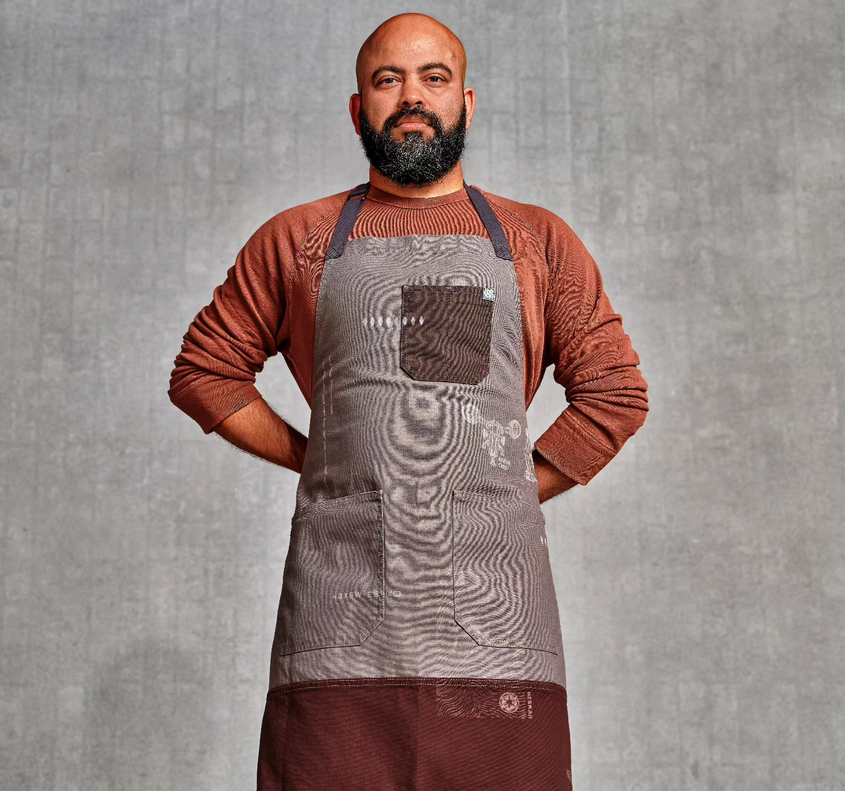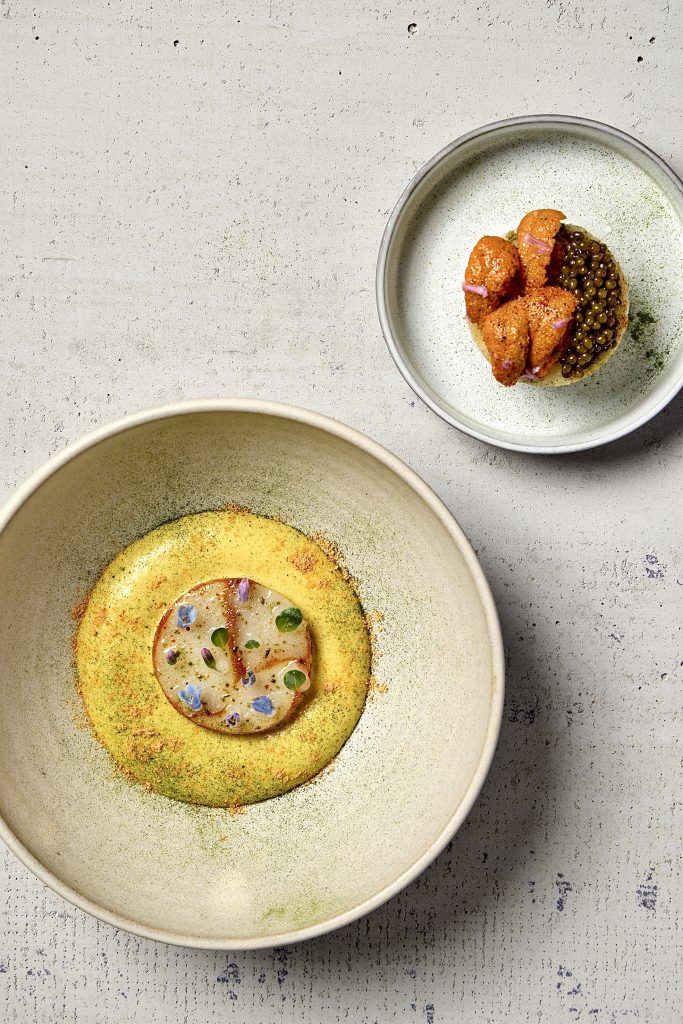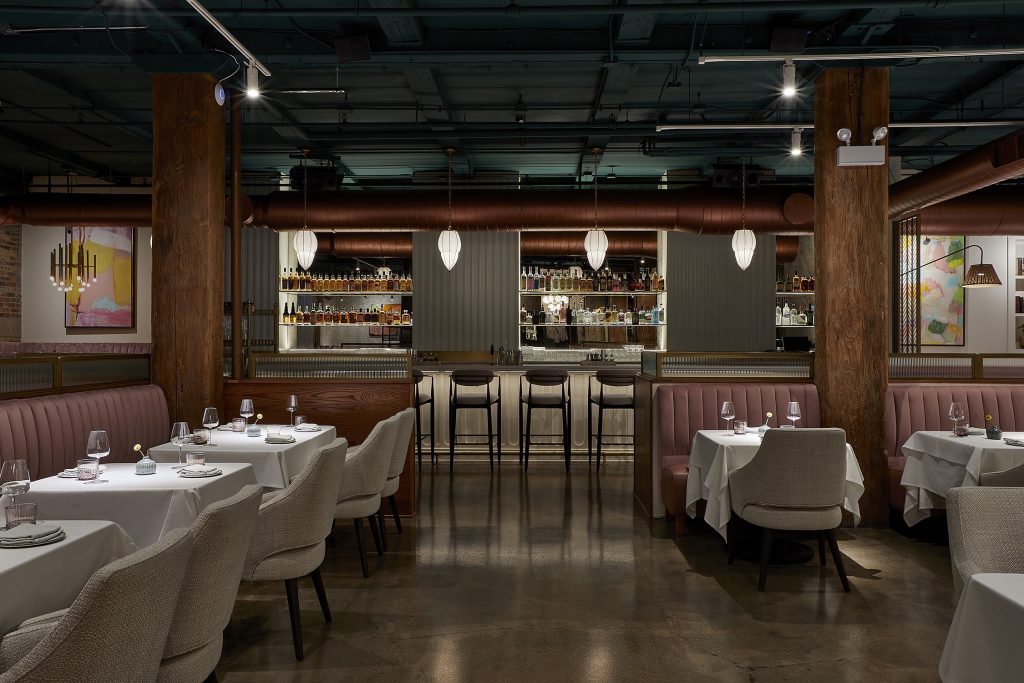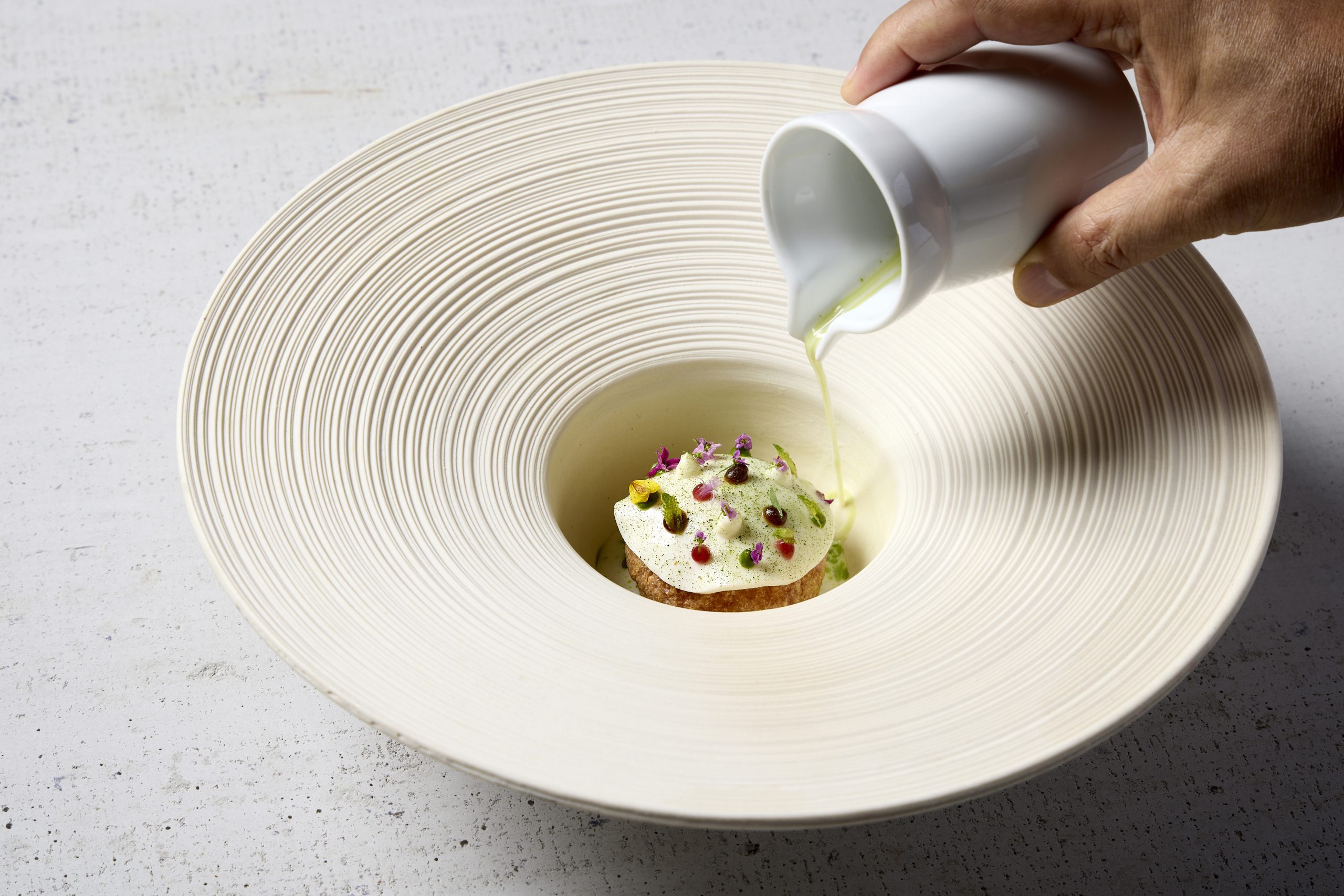(November 26, 2023) As one steps onto the quiet, tree-lined Huron Street in Chicago, it’s hard to miss the 19th-century printing warehouse that has now been converted into an Indian restaurant – Indienne – that speaks volumes about progressive Indian fine dining. When it first opened its doors for Chicagoans in the fall of 2022, its tasting menu that seamlessly blends Indian culinary artistry with the refined techniques of classic French cooking became an instant hit. In just fourteen months since its grand opening, Indienne has bagged its very first Michelin star, making Chef Sujan Sarkar proud and ecstatic. “We were expecting something but it was still a great feeling when it became official. A special moment and milestone for the team that has worked so hard,” Chef Sujan tells Global Indian.

Chef Sujan Sarkar
With the rave reviews and the grand reception that Indienne got in the first months of its opening, Chef Sujan was expecting a Michelin star “before a year was up.” However with a delayed ceremony this year, he had to wait a little. “Because of the standard we set, I definitely felt confident we would be recognised, by Michelin and by our diners,” says the Bengali Chef adding that at his restaurant one can expect a different interpretation of Indian food. “Come without expectations, you will enjoy the experience more. It will feel Indian and completely different at the same time,” he smiles.
Indienne is a restaurant that he calls truly his own as he saw it come into existence brick –by-brick, and wanted to bring “finesse, presentation, technique, a fresh format and a new interpretation for flavours and inspiration that are rooted in India.” But what sets this Indian restaurant apart from the many in the US is the tasting menus. “We do a lot of things differently; other than the dishes on the menu, simply the fact that we offer only tasting menus and such an extensive variety (the veg and non-veg menus do not overlap and are completely distinct from one another) make us stand out,” he explains, drawing attention to his version of yogurt chaat, tender coconut payasam and scallop with uni malai curry that he calls “unmissable”.
View this post on Instagram
An accidental chef
Hailing from a small town outside of Kolkata, Sujan’s early life was shaped by a deep appreciation for agriculture and locally sourced ingredients, a value instilled by his father, who is an agriculturalist. “As kids, we used to go to the haat (local market) on Tuesdays and Wednesdays with my dad, and the market used to be bustling and lively. It was the widest variety of fresh produce you could imagine – freshly caught fish (almost a hundred different kinds), chicken, goat, and more, even a few food stalls. How we learned about what was on offer was very organic as we would walk through the market and my dad would explain more about what all was there,” adds Chef Sujan.
It was this strong connection with his roots that formed the philosophy behind his restaurants. But not many know that being a chef was the last thing on his mind. He was keen to be a designer, however, he missed making it to the list in the top two fashion schools – NIFT and NID. “So I switched my line,” he says, adding that food was something that he always gravitated towards. He eventually enrolled at IHM Bhubaneshwar, a place that became a learning sanctuary for him. It was a lot different than cooking in his mom’s kitchen, but he enjoyed every bit of it, especially getting first-hand experience in professional kitchens during his internship. “I was in Cidade de Goa and I still have memories from there. Now it’s a Taj property,” says the Chef.

Scallop with Uni Malai Curry at Indienne
Mastering the craft of culinary creation
Understanding various culinary approaches and methods not only influenced his career but also defined his unique culinary style. Having learnt from some of the best-known chefs, he was keen to take over the world. He soon took a one-way flight to London, a chapter he calls “wildest and most colourful canvas so far.” It was in 2004 that he stepped into the pulsating city of London and started working at Galvin at Windows at the Hilton London Hotel. “I was a young chef, everything was new. It was hard work but also punctuated with a lot of fun and exploration. Eating out and exploring all the different markets. Fresh produce, different cuisine, everything was so novel,” says Chef Sujan for whom things got exciting when he took up his first Head Chef job at Automat in Mayfair at the age of 27. Soon after, he successfully opened and ran the adjoining Almada – a celebrity hotspot located on Berkeley Street, London.
Moreover, it opened up his mind as to “how the industry is about so much more than just cooking. It’s a community, it’s buzzing with camaraderie. You slog but you also have fun.” Those years in London honed his culinary skills alongside some of London’s finest gastronomic talents, and after a decade, he decided to return to India. His journey led him to Mumbai’s Olive Bar & Kitchen as an executive chef. In between, he also curated and launched TRESIND in Dubai and opened India’s first artisanal cocktail bar called Ek Bar in Delhi.

Michelin-award winning Indian restaurant Indienne
London – Mumbai – Chicago
Having spent over a decade in the UK, Chef Sujan was now ready to spread his wings in the US. In 2017, he opened the doors to a progressive Indian restaurant ROOH in San Francisco, serving a new India on the plate. This was followed up with another branch of ROOH in Chicago, Baar Baar in New York, and Indienne in Chicago. Ask him if his restaurants have helped shape the palate of food lovers in the US, pat comes the reply, “I think we have opened up people’s minds and perceptions to what Indian food can be. ROOH, Baar Baar, and Indienne are also geographically in different areas. I’m offering a wider variety to a wider audience and it’s a different level of offering. They are so different as experiences even to one another. The core idea is to always offer something different in a way that would spark their curiosity to know more about Indian food.”

Dahi Bhalla at Indienne
He has long aspired to elevate Indian cuisine onto the global stage, a vision he has consistently realised by reimagining and reinterpreting traditional Indian dishes to cater to an international palate. For him, it goes beyond mere food; it encapsulates our culture, art, and the essence of what defines India. He is glad to witness the global evolution of Indian cuisine, particularly noting the return of many Indian chefs to locally sourced ingredients. Though in its nascent stage, he says, “We are exploring more, digging deeper into ingredients that have been forgotten and that is opening up new possibilities.”
He has come a long way since his first venture but it hasn’t always been an easy journey. Putting the right team together was one of the biggest challenges as finding the team that “understands and is aligned with the vision, skill-set, concept and ultimately, execution,” was a herculean task. “Not many people here in the US are trained in this cuisine, Indian food is still not that popular. There was nothing much in the last 10-15 years, so it was a challenge to find the right team and even train them once they joined. It’s also about the team outside of the kitchen – the ones handling the front of house and other roles,” he adds. He also points out “finding the right audience who will embrace this and explore with you” as another hitch.
View this post on Instagram
Chef Sujan, who unwinds by running and listening to music or catching up on a new series, is keen to turn his Michelin star soon into two. “We’ll keep doing what we’re doing – grow our audience, grow our formats. Take our vision to a wider audience.”
He finds his roots in Indian cuisine but over the years, it has become his strength. “I’ve grown up eating Indian food. But as a chef, I wasn’t cooking Indian cuisine from day one. Now slowly, in the last 10 years, it has become my core strength. What I bring to the table today, what I have to offer to the diners, to the industry, to the ecosystem is much more. It’s a different vision and version of the cuisine, more modern and yet more easily acceptable. I’m an Indian chef cooking in America – it’ll always be like that. As long as I’m here,” he signs off.
